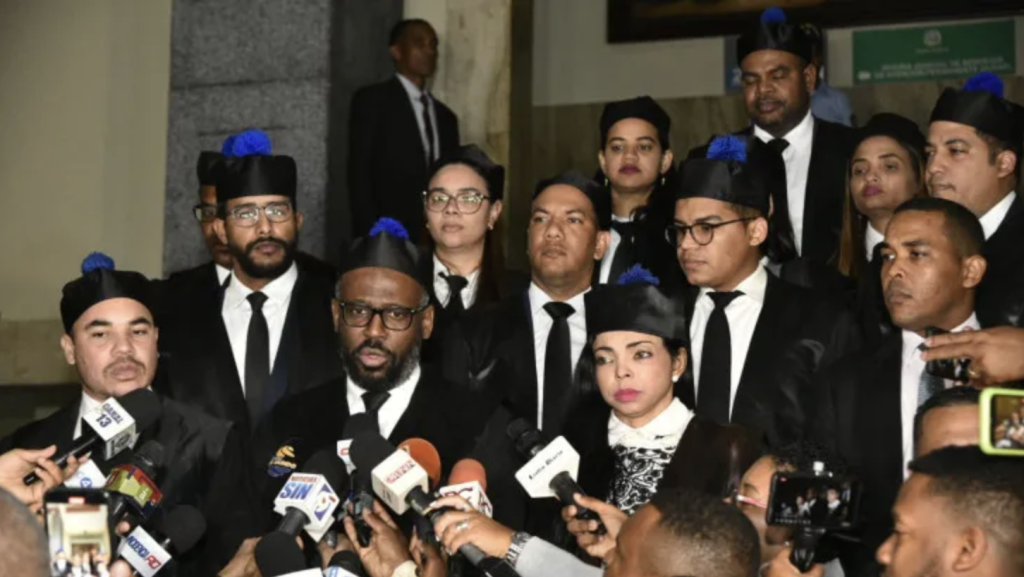
In the Dominican Republic, a judge hears the preliminary charges prosecutors present and the explanations from defense lawyers on whether their defendant has sufficient assets in the country or ties to the country to ensure that the person will appear at the future trial hearings. The preliminary custody measures trial is not held to present criminal charges. As said above, it is held to determine the preventive trial measures the judge will order, allowing the defendants to post bail, ordering electronic shackles, domiciliary arrest or sending the defendants to await trial in jail.
The law allows for a maximum of 18-months in pre-trial detention. In practice though, only those with very good lawyers and cash to spend on their defense, are allowed out of jail if the trial has not started after 18 months.
Now making headlines in the Dominican press is Operation Squid (Operación Calamar), the most recent government corruption case. Around 20 people are singled out in the case and around half of these have already declared themselves guilty and are collaborating with the prosecutors to be left out of the case future hearings. The collaborations have enabled the prosecutors to build their prosecution cases faster. In many cases, the deal means the collaborators return millions they have irregularly received as a consequence of the scams denounced by the prosecution. It is unclear whether what they have returned and shared in information with the prosecutors will remove these people entirely from the case.
While the law orders the pre-trial file to be confidential, in recent years the files have been leaked to the media, and the preliminary evidence in these corruption cases is the headline news for several weeks. This creates a social judging of the whistleblowers. In the past, and in many cases, this is the only penalty those accused of corruption crimes receive, as their lawyers find the way to get judges to absolve their clients.
The Operación Calamar focuses mainly on three corruption schemes that seek to make the rich richer and also collect cash for political campaigns into the 2020 general elections. The schemes were: government payments for lands that were expropriated; bribes on irregularly-operating betting shops; deals with State Sugar Council lands. The prosecution says it has found evidence the scams to taxpayers were for around RD$19 billion. The focus is on the actions that took place at the Ministry of Hacienda when the country was for the most in lockdown for the Covid-19 pandemic.
In the case of Operación Calamar, the first to strike deals with the prosecutors were business people Ramón Emilio Jimenez (Mimilo), Jose Arturo Ureña, and Fernando Crisostomo. The list now has expanded and includes lawyer and well known wheeler-dealer Angel Lockward, and the less known Santiago Moquete Sosa Ortiz, Alejandro Constanzo Sosa, Marcial Reyes, Ana Linda Fernández, Emil José Fernández, Oscar Chalas, Rafael Parmenio Rodríguez, Agustín Mejía and Víctor Matías Encarnación.
The main accused in the case are Danilo Medina administration former Minister of Hacienda Donald Guerrero, former Administrative Minister of the Presidency Jose Ramon Peralta and former Minister of Public Works Gonzalo Castillo. Castillo was the presidential candidate for the former ruling Dominican Liberation Party into the 2020 presidential election.
Wilson Camacho, head of the Anti Administrative Corruption Agency of the Attorney General Office (Pepca) said on Sunday, 2 April 2023 that during that day’s preliminary custody hearing, those striking deals told the court how the criminal network operated (mafia-style) and added lots of information to incriminate others in the case. “We must affirm that what has happened today in court is simply and plainly amazing for three reasons: in the first place, 10 defendants have admitted the facts before the court, which constitutes 50% of the defendants and 100% of the defendants who spoke today,” said the head of the Pepca, as reported in Hoy.
The Pepca seeks 18 months pre-trial custody for those incriminated in the case. Camacho says the criminal acts are serious, there is a need for damages to be compensated. He also said that there is evidence that several defendants infiltrated the prosecution investigation with the intent of impacting the outcome, even to the extent of profiling judges.
The hearing before judge Kenya Romero of the Permanent Attention Court of the National District to decide on pre-trial continues on Monday, 3 April 2023. Once pre-trial custody measures are decided, the next step is for a court to decide whether the evidence is sufficient to open the trial against the accused.
Meanwhile, with the leaking of the evidence during the custody phase, the social trial is happening as journalist and news commentators guide the population in general to get an insider look into the scam of taxpayer money that happened at the Ministry of Hacienda.
Read more in Spanish:
El Dia
Hoy
Noticias SIN
Diario Libre – former prosecutor Guillermo Moreno on Operation Squid
Acento TV – Interview with lawyer Luis Miguel Pereyra
Jose Peguero on who is Mimilo Jimenez
Edith Febles
El Democrata
Somos Pueblo
CDN
Diario Libre
Diario Libre
3 April 2023

